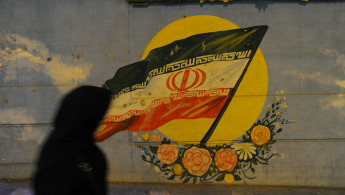Iran detains France-based opposition journalist in mysterious intelligence operation
Ruhollah Zam ran an opposition Telegram news channel dubbed Amadnews with hundreds of thousands of followers, which was said to have been a popular news source during protests in 2018.
Iran's Revolutionary Guards said they had detained Zam in a "sophisticated and professional operation", it said in a statement.
Zam lived in exile in Paris until he was "trapped" by the Revolutionary Guards intelligence, "using modern intelligence methods and innovative tactics".
It is not clear how he ended up in Iran, but some have suggested he could have been lured or kidnapped by the country's notorious intelligence services.
The Revolutionary Guards said the operation showed Iran's enemies were "lagging behind" its own intelligence services, accusing Zam of being "directed by France's intelligence service".
Last year, Iran's Telecoms Minister Mohammed Javad Azari Jahromi demanded Telegram shut Zam's Amadnews channel, saying it was inciting an "armed uprising".
The channel, which had around 1.4 million followers, was later removed.
Telegram was the Islamic Republic's most popular social network with some 40 million users before it was blocked by the judiciary last year.
|
|
Authorities had temporarily banned the messaging app the protests in early 2018, saying it enabled foreign-based "counter-revolutionary" groups to stir tensions.
'Emerging pattern'
Monday's arrest followed reports that Iran released a Russian journalist earlier this month, accused of having links to Israeli Mossad.
Yulia Yuzik, 38, who was arrested in Tehran a week prior to her release was sent back to to Moscow, Russia's embassy in Tehran confirmed at the time.
Tehran said she was being held over alleged visa violations but the Russian embassy said she had been accused of working for Israeli security services.
"As a result of joint efforts of the Russian foreign ministry and the Russian embassy in Tehran, Iran decided to release Russian citizen Yulia Yuzik," the embassy said on Twitter.
On 1 October, reports also said an Iranian court has sentenced an unnamed person to death on charges of spying for the US.
Tehran also confirmed the arrest of a British-Iranian anthropologist amid tensions with the US and Europe.
According to judiciary spokesman Gholamhossein Esmaili, the individual sentenced to death has appealed and a final decision will be made by the appeals court. He did not provide further details on the case or the identity of the suspect.
Esmaili also confirmed authorities had detained Iranian-British anthropologist Kameel Ahmady over suspected links to institutes affiliated with foreign intelligence services. He said the case was in the initial investigation phase.
Ahmady is the latest dual national detained amid heightened tensions between Iran and the West over its nuclear programme.
Clampdown
In August, Iran said it convicted a woman, Aras Amiri, who had worked for the British Council, a cultural and educational organisation, while allegedly spying on cultural activities in Iran.
Amiri has been jailed for the past year while her case was under investigation. She was sentenced to 10 years.
Another British-Iranian woman held in Tehran, Nazanin Zaghari-Ratcliffe, is currently serving a five-year prison sentence for allegedly planning the "soft toppling" of Iran's government while traveling with her young daughter.
Zaghari-Ratcliffe, who works for the charity arm of Thomson Reuters, was arrested in April 2016. Her sentence and her treatment while in prison have been widely criticised.
Iran does not recognise dual nationalities, cases involving which typically end up in closed-door hearings of Iran's Revolutionary Court, where former detainees say they had no opportunity to defend themselves against spying charges or offer evidence.
Analysts and family members of dual nationals and others detained in Iran long have said hard-liners in the Islamic Republic's security agencies use the prisoners as bargaining chips in negotiations with the West.
A UN panel in 2018 described "an emerging pattern involving the arbitrary deprivation of liberty of dual nationals" in Iran, which Tehran denied.
Esmaili also said on Tuesday the appeals court issued final decisions on two Iranians, identified as Ali Nafarieh and Mohammad Ali Babapour, sentencing them to ten years imprisonment on charges of spying for the US.
Another man, Mohammad Aminnassab, was sentenced to 10 years on charges of spying for the UK.
Iran often hands down heavy sentences on similar charges. In August, three people were sentenced to lengthy prison terms over security and spying charges.
Hardliners in Iran view the country as fighting a cultural "soft war" against Westernisation, which they believe is attempting to transform Iran's Islamic beliefs, although others accuse the regime on clamping down on all perceived critics.
Follow us on Twitter: @The_NewArab





 Follow the Middle East's top stories in English at The New Arab on Google News
Follow the Middle East's top stories in English at The New Arab on Google News
![Both Hamas and the Palestinian Authority welcomed the ICC arrest warrants [Getty]](/sites/default/files/styles/image_330x185/public/2024-11/GettyImages-2178351173.jpg?h=199d8c1f&itok=TV858iVg)

